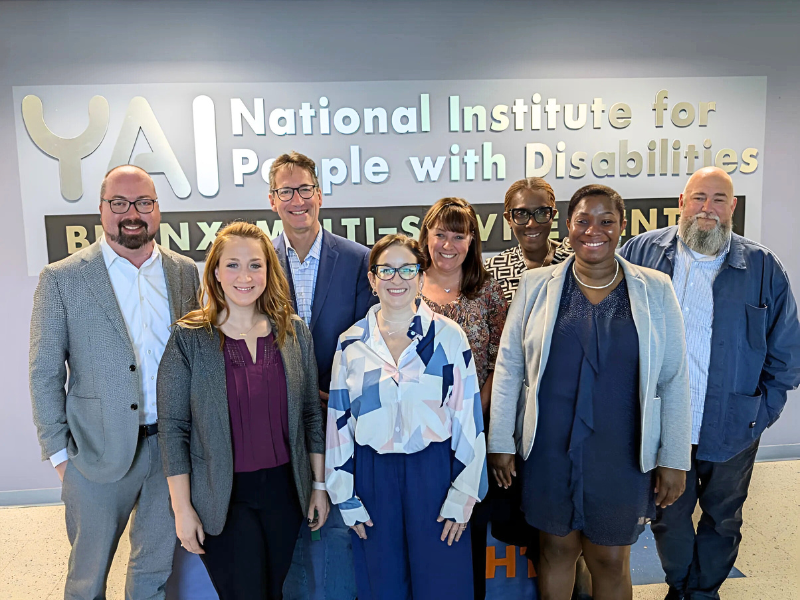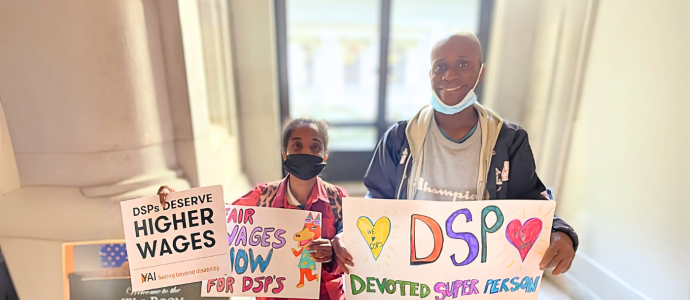Share
People with disabilities, and those who support them, know that lasting change requires persistence and advocacy. Despite years of underinvestment, advocates have never stopped pushing for the rights and support people with disabilities truly deserve. While progress has been gradual, the efforts of these advocates have made a real difference. Today, conditions are better than they were in 2019 pre-pandemic, and there is renewed hope that continued advocacy will lead to even more improvements in the future.
In early 2020, a decade of stagnant Medicaid funding and a growing workforce shortage had pushed the intellectual and developmental disabilities (I/DD) provider system to the brink. Then came the COVID-19 pandemic, forcing governments to finally address these long-simmering crises that had been escalating for years. Federal and state governments were forced to adapt, leading to significant shifts in funding and regulations.
“The brief, and inadequate, enhancement of Medicaid rates and federal funding from 2020 onward is now under severe threat.” said YAI Director of Government Relations Scott Karolidis. “Not only is DC not coming to save us but will be actively making our situation worse. We must go from asking for more from the government, to doing our best to prevent our few gains from being completely erased.”
In 2025, YAI will focus its advocacy efforts on New York, California, and New Jersey, the three states where the organization serves over 20,000 people. New York Disability Advocates (NYDA), a statewide coalition of nonprofits which includes YAI, is requesting a 7.8% rate increase for direct support roles. NYDA will also advocate for a human services wage commission, which is a committee that researches current wages, their impact in the I/DD field, and then recommends new wages. The final NYDA priority is capital funds for property renovations to address the workforce crisis and ensure quality services for adults with disabilities.
In California, advocates will monitor state revenues to secure promised wage increases, while a political battle will unfold to fully fund the 2025 rate study recommendations. New Jersey faces similar budget pressures and regulatory challenges, and at the federal level, Congress will make crucial decisions on Medicaid that could impact state plans nationwide.
While some progress was made in 2024, with rate increases and regulatory improvements, the pace of change varied significantly across states.
- In New York, the cost-of-living adjustment (COLA) fell short of expectations, increasing by just 2.84% despite rising inflation.
- California passed a law requiring annual reviews of funding rates, a positive step, but its impact depends on available budget funds. Healthcare workers in the state recently secured a wage increase, though this falls short of the "living wage" promised in 2021.
- In New Jersey, lawmakers are considering new regulations for provider agencies, but these efforts lack the necessary funding to address the severe workforce shortage.

While progress remains slow, these changes are starting to make a difference. In New York State, for example, there has been a decrease in the number of vacant DSP positions. This positive trend is a direct result of the tireless advocacy efforts of organizations like YAI. Over the past three years, we've mobilized our community, hosting over 70 legislator site visits, organizing thousands of calls and emails to elected officials, and mobilizing hundreds of people for rallies. This collective action has helped to improve conditions for DSPs and ensure better care for people with disabilities.
"YAI's advocacy work is needed now more than ever," said Steven Holden, a YAI self advocate who has participated in several rallies in Albany to advocate for higher staff wages. "We want more staff, we want them to stay longer, and we deserve a chance to choose who cares for us." Holden has been receiving YAI services since 2001 and, together with his girlfriend Janelle Smith, is actively advocating to end marriage penalty laws that could jeopardize their Supplemental Security Income and impose penalties if they were to marry.
Other hopeful signs persist, especially at the state level. States like California, New York, and New Jersey are likely to position themselves as opposing a federal government seen as hostile to Medicaid. The combination of modest revenue increases and healthier-than-expected state budgets creates a potential window for states to increase Medicaid rates without the need for additional federal funds. While concerns about the economy might suggest caution in spending, the reality is that the economy, state budgets, and advocacy work of I/DD service advocates have exceeded expectations since 2020.
In every state and at every level: local, state, and federal, the voices of people with disabilities, their families, and the workers who support them are crucial. Their direct involvement in advocacy efforts is essential to securing the funding needed for critical programs like Medicaid - one of many government programs at risk under the next administration. Only through sustained and collective political action can we ensure Medicaid remains fully funded and prioritized for the future.
“Getting politicians to see the programs in their districts and understand the challenges people with I/DD and our workforce face is crucial,” said Karolidis. “Once they see firsthand how badly additional funds are needed, and how much the people we support contribute to the community, they are much more likely to help us.”
Visit www.yai.org/advocacy to see the latest actions you can take to help ensure people with I/DD get the quality services they deserve.

